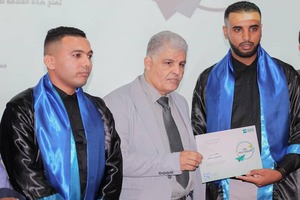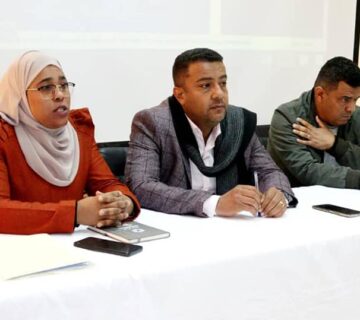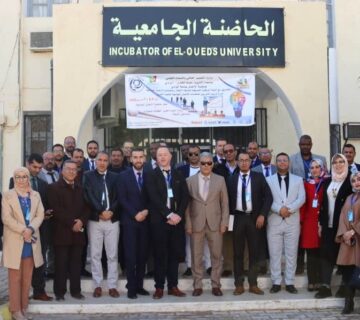عصا ذكية ونظارة ناطقة للمكفوفين وتطبيق لنقل البضائع
Today, 6-6-2023, the two students, Khiari Ahmed Khiari and Mahmoud Aiba, from the Faculty of Technology at the University of Martyr Hama Lakhdar, discussed a master’s degree graduation memorandum within the framework of the emerging institution – a patent in accordance with Ministerial Resolution 1275, which centered around presenting three inventions that the two students arrived at and related to an application for transporting goods, which received an award. The trademark (label) of the student Khiari Ahmed Khiari, as well as an innovative project represented by two smart devices jointly between the aforementioned student and the student Mahmoud Aiba, which are a smart cane and talking glasses for the benefit of the blind category.
The discussion session was attended by the University Rector, Professor Omar Farahati, his Deputy for External Relations, Professor Habib Qeddah, the Director of the Business Incubator, Muhammad Fouad Farahat, and a number of professors, students, and their parents.
The discussion committee was formed of six members: the head of the committee, Dr. Shuaib Al-Abyad, two examiners, Dr. Misbah Al-Awamer and Dr. Mansouri Khaled, the incubator representative, the supervisor of the two students’ work, Dr. Hakima Al-Sharif, and her assistant, Dr. Allaq Nusseibeh, in addition to the economic partner, the representative of the Directorate of Solidarity and Social Activities.
Before the discussion session, the University Rector gave a speech in which he praised the students’ achievements and their research projects, which – as he said – turned into patents for the benefit of society, whether those related to the (Safir) application for transporting goods or the smart cane and talking glasses for the benefit of the blind category. Waiting for important innovative projects to be completed. Discuss it in the coming days. The University Rector also appreciated the work of the committee supervising the evaluation of the students’ research project, as well as the great role played by the incubator director in supporting and accompanying the projects of emerging institutions – the patent within the framework of the strategy of the Ministry of Higher Education and Scientific Research, pledging to provide all material, moral and pedagogical support to help the students achieve their goals and transform The university is a contributing factor to economic and social development by solving many of the problems raised through these innovative projects.
Dr. Hakima Al-Sharif, the supervisor of the two students’ graduation thesis, who received the distinction degree, explained that the first invention by the student, Khiari Ahmed Khiari, which is the Safir application, which can be downloaded via the Internet, would help the customer transport his goods with ease and from anywhere, as the application connects the person who wants to transport his goods. With the driver, this involves requesting the chosen means of transportation in a few minutes and contacting him, specifying his location and destination, the type and weight of the load, the distance and duration of its arrival, and choosing the appropriate price with the customer. She explained that the customer first creates his free account and then registers his personal information (name, surname, number, email, and password) and it remains saved in the application. Upon entering the application, he chooses the vehicle he wants, the type of goods, and the region, and it is sent to the driver, where the latter reviews his request and sends the specific price for the type of load and sends it to the customer, through which he approves it and transports it to the specified place. She indicated that the inventor received an investment offer from economic traders from Oran, the capital, and the Sultanate of Oman.
As for the second and third inventions, shared by student Khiari Ahmed Khiari and student Mahmoud Aiba, they are two smart systems for the benefit of the blind. The first is a smart stick that contains an ultrasonic sensor capable of detecting obstacles and sending alert signals to the blind person through sound and ringing. The second invention is smart glasses equipped with an artificial intelligence camera. The camera captures images of obstacles and then recognizes them through a pre-trained artificial intelligence algorithm. Then the name of the obstacle is converted into a sound that the blind person listens to via a headset connected to the glasses.
On the sidelines of the discussion session, the incubator also organized a technology exhibition of the most important innovations accomplished by the students within the framework of innovative projects, which were closely viewed by the University President, his deputy in charge of external relations, members of the discussion committee, professors, students, and their parents, as they were impressed by the innovations reached by the male and female students of the University of the Valley.



